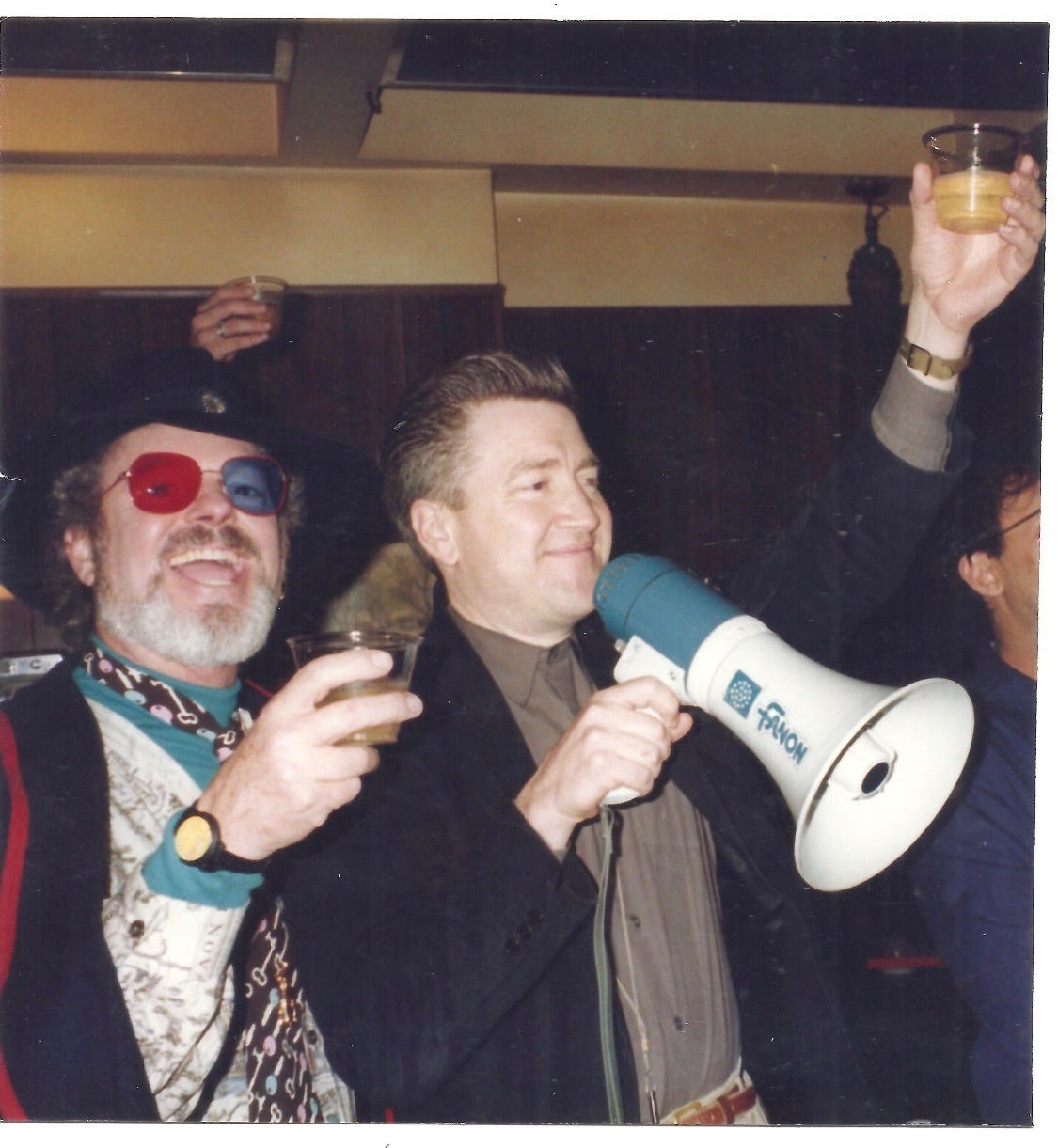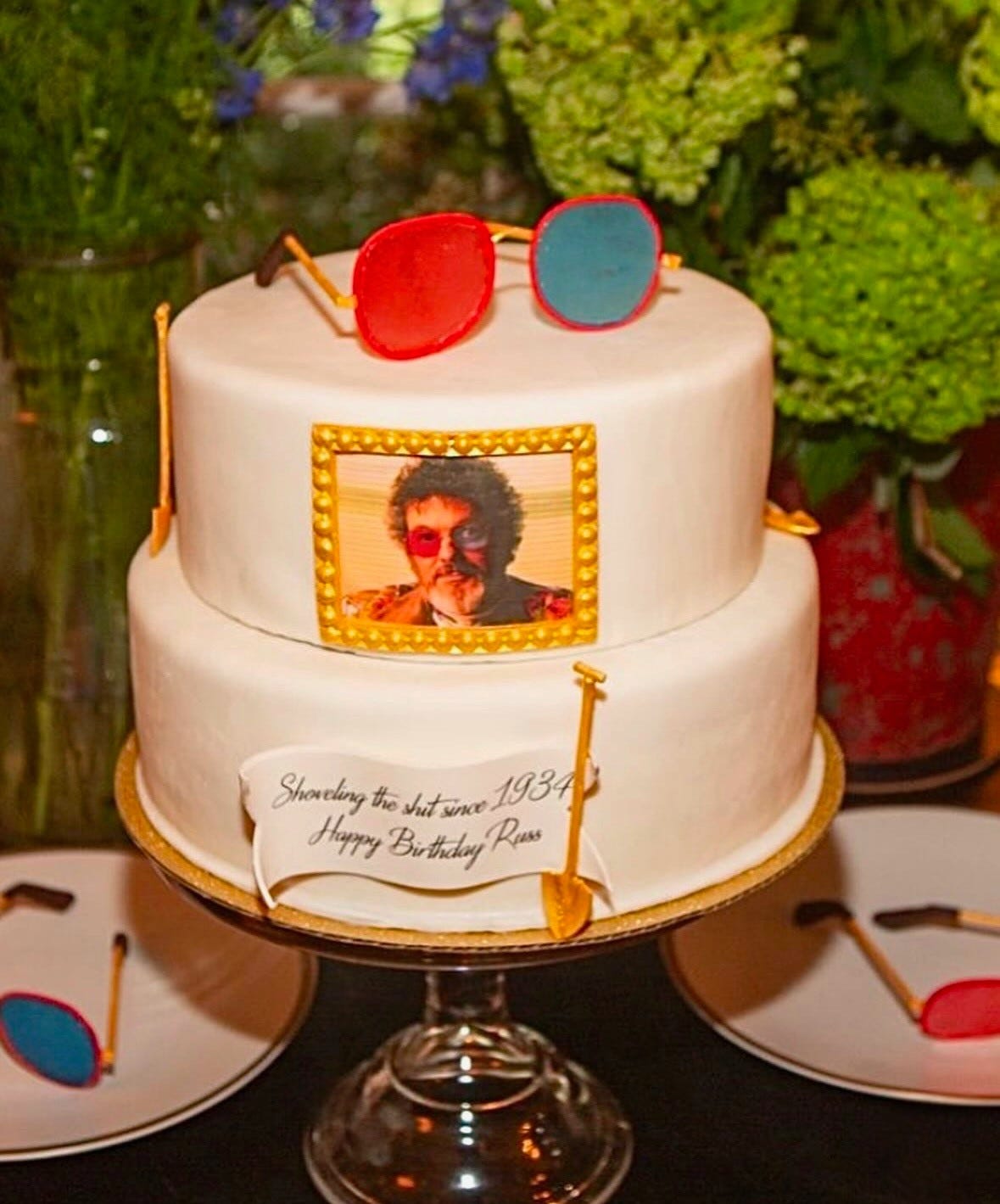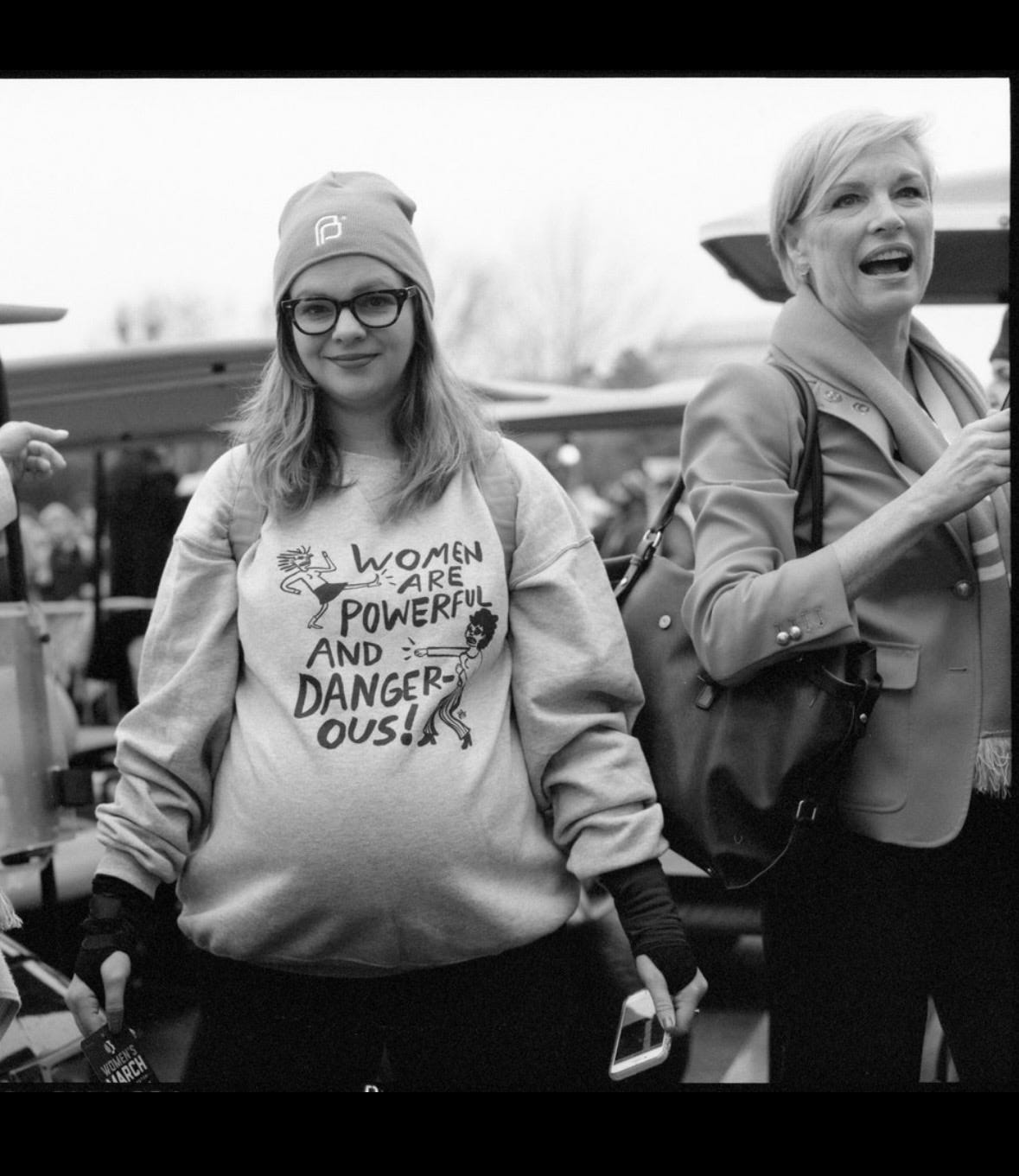Into the Dark: David Lynch, Cecile Richards, and Shared Grief
On losing two titans of art and activism and what endings can teach us in the age of Trump.
In the early nineties, my dad, Russ Tamblyn, was invited to filmmaker David Lynch’s birthday party by their mutual friend, Dennis Hopper. During the party, David showed my dad a birthday card he had received with a picture of some faraway tropical paradise on it, “Boy, wouldn’t you like to be there right now.” My dad responded, “Actually, David, what I’d really love is to work with you.”
In the sixties, shortly after starring in West Side Story and at the height of his career, my dad decided to leave the world of mainstream studio filmmaking to pursue his artistic passions, a choice he felt would bring him greater personal fulfillment than continuing on in what he viewed as the more shallow Hollywood scene. Many were making similar life changes in this post-World War II era: “Turning on, tuning in, and dropping out,” as the great psychologist and psychedelics-enthusiast Timothy Leary once described it. My dad spent nearly two decades living in Topanga Canyon making art and experimental films with the likes of Ed Ruscha, Wallace Berman, and Bruce Conner, among others.
Then, in the early eighties, around the time I was born, Dad attempted a comeback to the Hollywood movie-making business only to find it had largely changed, and he had largely been forgotten. He struggled to book jobs, and most of my early memories of him were not of a famous movie star, but of a man who painted houses and did whatever work he could to make ends meet. But shortly after this serendipitous meeting at David’s birthday party, my dad would be cast in Lynch’s next project, the beloved cult classic television show Twin Peaks. In it, he played Dr. Jacoby—a kooky yet unnerving psychiatrist who wore a now-iconic pair of glasses with one red lens and one blue.
The experience of working with David on the show changed my dad’s life, reviving his acting career at a time when he really needed it. It was more than just a job for him—it was a reminder to the world, and to himself, that Russ Tamblyn always had been, still was, (and still is) the coolest of the cool, and an artist through and through. I’ve written before on the transformative power of being believed in and how that charted my own path in the film industry, and I think this was my dad’s own version of that.
This past December, Dad turned ninety years old, and for his birthday party, David and his longtime producing partner, Sabrina S. Sutherland, had a very special cake designed for the occasion, complete with Dr. Jacoby’s signature glasses on top, delicately crafted out of sugar by cake artist Michael Carney. On the front of the cake was a photo of my dad in character, along with a sugar plaque bearing the words, “Shoveling the shit since 1934,” a nod to the year my dad was born and Dr. Jacoby’s famous line from the 2017 reboot of Twin Peaks.
My dad called David a few weeks later to thank him for the kind gesture and to check in with his old friend of more than thirty years. But they didn’t get to speak. David died a few days later.
Lynch was hugely influential to me as well, and not only because of my dad’s proximity to him. As a child, I wasn’t allowed to watch Twin Peaks for obvious reasons, but decades later, I would reach out to Lynch with a proposition (I had hoped) he could not refuse. I was working on a book of poetry and art about the lives and deaths of child star actresses, and I wrote to David to try and entice him to contribute a piece of original artwork to the book.
I told him I had a story to share with him—something that not even my parents knew about: Years ago, in the small apartment where I grew up in Southern California, I would stick my Hello Kitty mirror out of my bedroom door to sneakily watch episodes of Twin Peaks when my parents thought I had gone to bed. So I had, in fact, seen many episodes of the show at a very young age, many of which informed so much of my writing and art as I got older, cementing David as an inspirational force in my artistic life. My plan worked and I sent him one of my favorite poems from the manuscript, “Laurel Gene.” David particularly gravitated toward the lines in the poem, “I was his dark sparkler. A tarantula on fire.” These lines would inspire David’s charcoal drawing published alongside the poem, as well as the eventual title of the book itself, Dark Sparkler.
David was very vocal about how meditation changed his life and informed so much of his art. To honor him after his passing, his family organized a worldwide group meditation at exactly 3pm Eastern Time on January 20th, which would have been David’s seventy-ninth birthday. In David’s name, they called on people across the globe to attune their subconscious energy toward light, love, and kindness, en masse.
The day the meditation was to take place, I woke up with dark feelings about a presidential inauguration I was determined not to give my energy or attention to. Instead, I would focus on honoring and remembering David. Just as I tried to shift my focus from the day’s dystopian political event, I learned that my good friend, political activist and president of Planned Parenthood for seventeen years, Cecile Richards, had died from brain cancer at just sixty-seven years old.
I met Cecile when I was twenty-one years old and became a supporter of Planned Parenthood, using my platform to champion the organization and all that it has done to fight for the health care of so many. Years later, after Trump had won his first election, I went to Washington D.C. with so many others to participate in the first-ever Women’s March. I was eight months pregnant with my daughter at the time, and my doctors advised me not to go, that traveling at this stage of pregnancy could be risky. But there was no way I wasn’t going—and besides, what better place to go into labor than in a sea of women?
The first stop in D.C. was a Planned Parenthood breakfast hosted by Cecile. When the breakfast was over, she took one look at my massively pregnant belly and said, “How are you getting to the march?” I told her I wasn’t sure, but was probably just going to walk there. She raised a signature gorgeous eyebrow and said, “No, you’re not. Get in the van with me.”
Me and Cecile, plus some friends who had also come to D.C., made our way to the entrance of the march and remained beside each other for the rest of the day. We felt alive with a new kind of palpable, raw rage, like something was brewing deep in all of us, just beneath the surface. And it was. That march and that year would give way to the #MeToo Movement and so much more.
Cecile and I were friends from then on, supporting each other’s work and calling each other for thoughts or advice on how to handle life’s challenges, be they political or personal. Through Elsa Collins’ incredible organization, This Is About Humanity, Cecile and I were able to lead a delegation to Tijuana to meet with displaced and separated families stuck at the border of the U.S. and Mexico. For years, Cecile and I worked together, dined together, laughed together, argued together, marched together, and imagined a better world for women everywhere—together.
On Monday at 2:45pm ET, I was preparing to sit in meditation and to be only with my immense grief about the death of David Lynch, but after learning of Cecile’s death that same day, I understood this meditation to be a greater gift than I had realized. With it, I was given the much needed task of opening up and prioritizing a specific space in time to organize all my griefs and let them all be felt in the way they needed to—from David, to Cecile, to the election, to the inauguration, to the fires in my hometown of Los Angeles.
The intention of this meditation was in David’s name, but it was now a container for so much more, and I was immediately grateful for it. I made my way outside to my back porch, the world around me covered in snow and freezing temperatures. I settled into my chair, the huge blanket I had pulled off my bed wrapped around me tightly. My cheeks were covered in frozen tears as I closed my eyes at 2:59pm, leaning fully into every ache emanating from within me: all the loss, all that’s leaving, all that’s soon to go.
I imagined a million eyes all over the world closing too.
A million eyelashes fluttering into darkness,
sitting with our collective sadness.
The heaviness of endings in order to make space for the light of new beginnings.
In the dark, I could hear a single bird singing
somewhere deep in the woods.
The sounds of wind rustling thick, sleeping snow from tree branches.
My daughter laughing deep inside the walls of our warm home.
My daughter growing inside my body in 2017.
Cecile placing her hand on my stomach in the van and smiling.
Cecile in the greenroom in New York City.
Cecile across the table in Texas.
Cecile’s arm linked in mine, the fight in her, the passion, ever present.
Cecile on the train ride, telling me how proud she was
of the woman I’ve become.
David Lynch reading my poems with his charcoal in hand,
telling me how proud my father must be
of the artist I’ve become.
My father painting houses.
My hand holding the Hello Kitty mirror,
watching what I wasn’t allowed to, teaching myself young
how to break the rules in the name of my own voice.
The darkness of living, and the light of loss;
What’s illuminated from all of it.
What can and must be found.
Slowly
Slowly I came out of meditation. I opened my eyes and felt millions of eyes across the world open too. My face, as cold as anything could be, my heart—our hearts—wide open like a door we’re ready to walk through, to meet whatever may be on the other side.
REMINDER: This Saturday, I’m hosting The Short and Sweet, our monthly live gathering for paid subscribers over Zoom. The theme this weekend will be Writing in the Dark to Harness the Light: An Ode to David Lynch and Cecile Richards. I’ll lead us through a brief conversation about art and activism and how to quiet the mind in order to center them both. We’ll do some journaling and writing, so bring your pens and journals if you want to, or you can just sit and listen. The Short and Sweet will take place this Saturday, January 25, from 2pm-3pm ET. You can manage your subscription here. (The Zoom link will be emailed to paid subscribers thirty minutes before the start of The Short and Sweet.)









Thank you for this journey. Bless them both forever 🙏
I'm so sorry for the losses you've experienced.
Looking forward to Saturday's Zoom. Thank you for picking Saturday, not Sunday. IYKYK